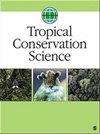Desiccation of Wetlands and Their Influence on the Regional Climate. Case Study: Ciénaga de Aguablanca, Cali, Colombia
IF 1.6
4区 环境科学与生态学
Q2 BIODIVERSITY CONSERVATION
引用次数: 3
Abstract
The desiccation of wetlands is a process associated with the dynamics of urban growth and expansion of the agricultural frontier. This article aims to evaluate the influence of the desiccation of the Ciénaga de Aguablanca on regional climate. The periodization of the desiccation and urban growth of Cali was reconstructed under the theoretical contributions of environmental history. As complementary sources, maps, aerial photographs, and diagrams of the city were obtained from 1944 to 2020, with which the hydromorphological changes in the Ciénaga de Aguablanca were represented. Data from six hydroclimatological stations were statistically analyzed with Pettitt’s test, trend analysis, and Rclimdex. The results indicate a reduction of 99% in the area of the wetlands, from 19.2 km2 in 1944 to 0.2 km2 by 2020. Additionally, a break point was observed in 1970, preceded by the process of wetland desiccation and waterproofing of the eastern part of Cali, along with significant differences between temperature series inside and outside the urban perimeter. Another break point was detected in 1985 in the flow series, associated with the construction of the La Salvajina dam. Monthly rainfall showed a tendency to increase, but its temporal distribution was uneven, given that rainfall volume showed a tendency to increase over short times. Regional climate changes can occur at a much faster rate than global variations due to the anthropogenic actions of wetland intervention.湿地干旱化及其对区域气候的影响案例研究:哥伦比亚卡利市阿瓜布兰卡市cisamunaga de Aguablanca
湿地的干燥是一个与城市发展和农业前沿扩张的动态相关的过程。本文旨在评估阿瓜布兰卡岛干旱对区域气候的影响。卡利干燥和城市发展的周期性是在环境史的理论贡献下重建的。作为补充来源,从1944年到2020年,获得了该市的地图、航空照片和图表,用它们来表示阿瓜布兰卡河的水文地貌变化。采用Pettitt检验、趋势分析和Rclindex对六个水文气象站的数据进行统计分析。结果表明,湿地面积减少了99%,从1944年的19.2平方公里减少到2020年的0.2平方公里。此外,在1970年观察到一个转折点,在此之前,卡利东部的湿地干燥和防水过程,以及城市周边内外温度序列之间的显著差异。1985年在流量序列中发现了另一个断裂点,与La Salvajina大坝的建设有关。月降雨量有增加的趋势,但其时间分布不均匀,因为降雨量有在短时间内增加的趋势。由于湿地干预的人为作用,区域气候变化的发生速度可能比全球变化快得多。
本文章由计算机程序翻译,如有差异,请以英文原文为准。
求助全文
约1分钟内获得全文
求助全文
来源期刊

Tropical Conservation Science
BIODIVERSITY CONSERVATION-
CiteScore
3.60
自引率
5.90%
发文量
16
审稿时长
>12 weeks
期刊介绍:
Tropical Conservation Science is a peer-reviewed, open access journal that publishes original research papers and state-of-the-art reviews of broad interest to the field of conservation of tropical forests and of other tropical ecosystems.
 求助内容:
求助内容: 应助结果提醒方式:
应助结果提醒方式:


